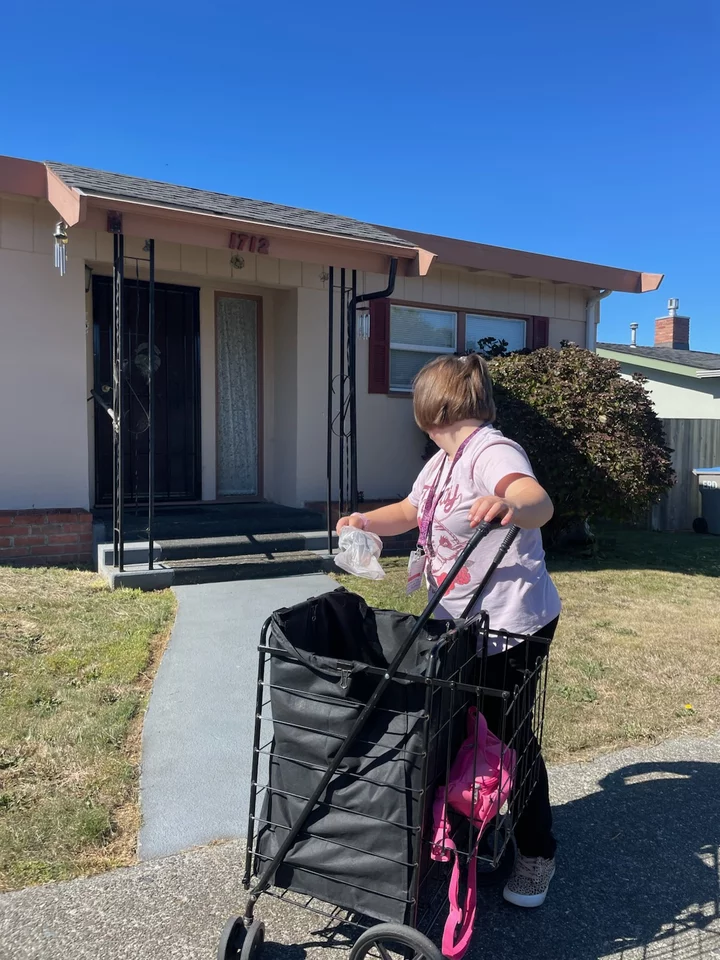Diane Cathey Center client Madison Titus prepares to throw an issue of the Tri-City Weekly at a porch.
Intellectually disabled adults at the Diane Cathey Center have, for the past 25 years, delivered the Tri-City Weekly around Fortuna. They rolled the papers up, walked around, dropped them off, and made a little money and earned some self-respect in the process.
That’s over now, as Media News Group, the owner of the Tri-City Weekly (as well as the Times-Standard), has decided to cease publication. This week was the Tri-City’s last printing, and its demise takes with it the livelihoods of some of Humboldt’s most vulnerable.
The Diane Cathey Center is a Fortuna-based nonprofit that supports adults with developmental and intellectual disabilities by training and educating them. Getting them jobs is a big part of that, Director Barbara Nelson told the Outpost recently. The center’s clients (currently numbering 10) learned skills delivering the papers and developed a routine they depended on. Some of them delivered those papers for 25 years. Community members looked forward to their deliveries and sometimes even invited the paper deliverers in for a snack. Couriers noticed when there were several weeks’ worth of papers out on a porch and checked up on the residents.
It’s a sad situation for everyone involved, said Nelson.
“It takes away their self-esteem,” Nelson said. “It takes a part of their livelihood. It takes away from being out there, being seen, being participants, being part of their community. It takes that away.”
Though there are many types of work the DCC’s clients can do, Nelson said most employers won’t hire them because they take longer to complete their work than neurotypical people. Employers are also usually concerned about working space if the clients need someone with them, like a disabled shelf-stocker with a companion handing them items.
“So the problem becomes ‘How do you find someone that wants to pay minimum wage to have something done that may take a little longer?’” Nelson asked. “It would have to be someone with some heart, and understanding that it may take our people a little bit longer, but they can do it.”
In the years since the center was founded — in 1999 — the increasing digitization of the modern world has made several of the jobs DCC’s clients could do go obsolete, such as delivering flyers for local businesses and shredding paper.
Some of the DCC’s clients have part-time jobs maintaining flower boxes or volunteering at thrift stores, but delivering the Tri-City was a main occupation for many of them. Job openings for the intellectually disabled are limited in small towns, especially a place as isolated as Fortuna.
“Most of them are still trying to absorb it,” Nelson said. “It’s not going to become a major reality until next week, when they would normally come in, and it would be time to roll their papers, and then it would be time to go deliver … . For some of them, we have to keep a routine. So what we’re going to end up doing is walk their old paper route with them and keep telling them ‘No papers,’ but at least keep that little bit of familiarity there for right now.”
Diane Cathey administrators currently don’t have anything lined up to replace the paper routes. Nelson said they were given less than two weeks’ notice that printing was over.
It’s also a big hit to their independence, Nelson said. Though the clients didn’t make a ton of money, it was enough to buy treats for themselves like hot chocolate or something from a thrift store. One girl saved her earnings so she could buy more backpacks for her collection.
Nelson laughed. “I swear, she must have 150 of them!”
“That check comes in, and it’s big money to them … ,” Nelson said. “And it feels good to say, ‘I made this money. I made this purchase. This is me. This isn’t someone coming to rescue me or do it for me or give me the money. This is me.’ And they won’t be getting those paychecks anymore.”

CLICK TO MANAGE